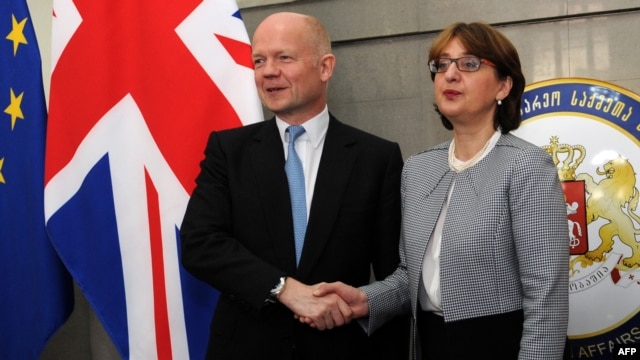British foreign minister backs Georgia's NATO membership
| Publisher | Radio Free Europe/Radio Liberty |
| Publication Date | 8 May 2014 |
| Cite as | Radio Free Europe/Radio Liberty, British foreign minister backs Georgia's NATO membership, 8 May 2014, available at: https://www.refworld.org/docid/53a1388bd.html [accessed 29 May 2023] |
| Disclaimer | This is not a UNHCR publication. UNHCR is not responsible for, nor does it necessarily endorse, its content. Any views expressed are solely those of the author or publisher and do not necessarily reflect those of UNHCR, the United Nations or its Member States. |
May 08, 2014
By RFE/RL
 Georgian Foreign Minister Maia Panjikidze (right) with her British counterpart William Hague in Tbilisi on May 8.
Georgian Foreign Minister Maia Panjikidze (right) with her British counterpart William Hague in Tbilisi on May 8.
British Foreign Secretary William Hague has arrived in Georgia and voiced "very clear support" for the Caucasus country's bid to join NATO and the European Union.
Arriving in Tbilisi on May 8 after visits to Moldova and Ukraine, Hague spoke of "our support for Georgia's Euro-Atlantic ambitions" after meetings with Georgian Prime Minister Irakli Garibashvili and Foreign Minister Maia Panjikidze.
Panjikidze noted the significance of Hague's visit ahead of the "Georgia-EU association agreement due to be signed this June."
Panjikidze also described as just "an idea," a proposal Georgian Defense Minister Irakli Alsania made during a recent visit to Washington about NATO redeploying "defense capabilities" in Georgia.
In Washington on May 7, Georgian Defense Minister Irakli Alasania justified his recent call for NATO to position "defensive capabilities" within his country amid growing concerns in Tbilisi about Russia's role in Ukraine's escalating crisis.
Speaking before talks with U.S. Defense Secretary Chuck Hagel, Alasania told RFE/RL that it is "the right time now" to take "another step" in parallel with enhanced military cooperation with the NATO alliance.
"We don't want Europeans and other guys to see – or take note – that we are [waiting] to get security guarantees from our integration to NATO until we are going to get membership," Alasania told RFE/RL. "This is why enhanced security cooperation will mean we are going to need more defensive capabilities."
The Pentagon says Hagel promised on May 7 to continue U.S. military cooperation with Georgia, which fought a brief war with Russia in August 2008 over Georgian separatist regions.
The Pentagon's spokesman, Rear Admiral John Kirby, encouraged the Georgian government to continue with defense reforms and efforts to enable its military to operate together with NATO forces.
Georgia has previously sent troops to help countries from NATO in operations in Iraq and Afghanistan.
Alasania dismissed the idea that enhanced military cooperation between Tbilisi and NATO would provoke Russia.
"That's the pre-Crimea thinking. There is a new reality," he said. "Russians are creating new realities on the ground."
"They are breaking and tearing up all the agreements that you had with them and the U.K. over Ukraine," he added. "They violated international law and sovereignty in 2008. That's erroneous thinking that there's anything we can do to ... irritate Russia [more]."
'Open' To Relations With Abkhazia, South Ossetia
On May 1, Alasania called for enhanced defensive assets from NATO during a speech at the Atlantic Council in Washington.
Specifically, Alasania called for "antiarmor, antiaircraft and antitank" capabilities that would be "purely defensive weapons."
When asked about NATO Deputy Secretary-General Alexander Vershbow's recent comments that NATO should see "Russia no longer as a partner but as more of an adversary," he said he "certainly" agreed with him.
Alasania, however, held out hope for better relations with Russia in the long run, agreeing with Georgian President Giorgi Margvelashvili's recent comments to RFE/RL that he sees hope for a "rational dialogue" with Russia.
"Georgia has a rational outlook in the long run, in the coming 10-15 years, that we may talk with Russians and explain to them that we are not posing any threat to Russia's national security interest," he said.
Alasania ruled out a military solution to the conflicts in South Ossetia and Abkhazia, which Russia recognized as independent states following the August 2008 war with Georgia. Only a few countries followed Russia's lead.
"There is no way we are going to start solving the de-occupation problem with military force – it's well communicated with the Abkhaz and Ossetians," he said.
"We are going to demonstrate that we are open to [a] relationship with them on health care, humanitarian affairs, trade, economy. I think the only key to gain the trust between war-torn societies is to make them communicate with each other."
With reporting by AFP, Reuters, Interfax and Trend.az
Link to original story on RFE/RL website
